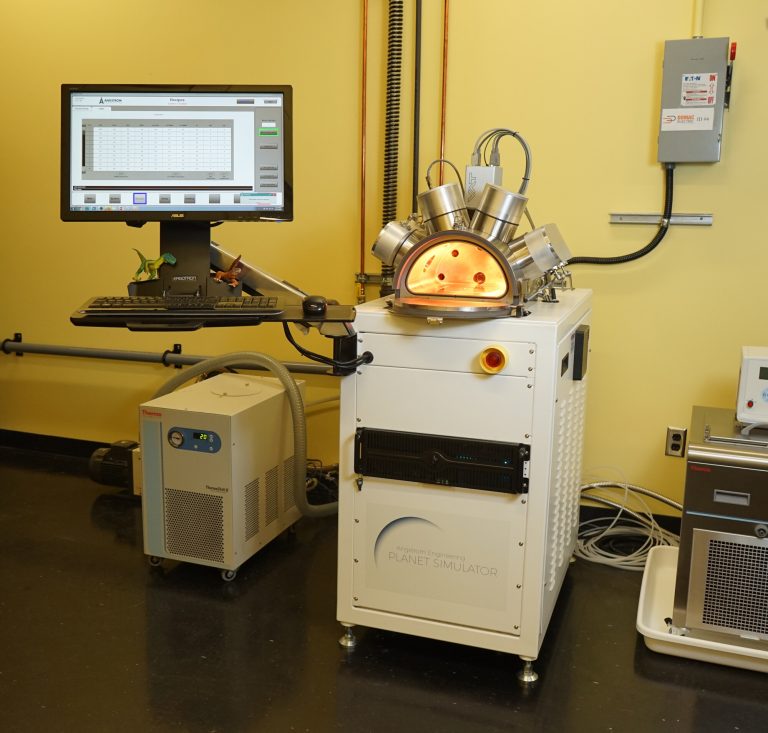Research

Origin of Life Laboratory
Origins Institute members have pioneered technology to provide experimental evidence about how ‘life’ (i.e., living entities) formed on Earth.
Research Streams
Origins Institute members implement inquiries into space-time and its complexity. Researchers investigate the early universe and its accelerated expansion as well as dark matter and dark energy.
Origins Institute members explore the chemical history for globular cluster stars and determine how elements are formed inside red giant stars. Researchers also conduct experiments to understand how nuclei in gamma-ray astronomy are produced.
Origins Institute members investigate how stars, planets, and galaxies form. Researchers use of state of the art supercomputer simulations as well as theoretical and mathematical modeling; advanced observations at radio, optical, and millimetre telescopes and observatories, on the ground & in outer space; these include CFHT, ALMA, JCMT, and Gemini (ground) & the Hubble Space Telescope and Herschel Space Observatory (outer space).
Origins Institute members test hypotheses about how life formed – from planetary systems, habitable conditions, and biomolecule emergence to the first living entities that appeared on Earth and possibly other planets. Observational, experimental, theoretical and computational researchers explore three areas – conditions for life, origins of life, and extremophiles as well as extreme-tolerant organisms.
Origins Institute members perform molecular evolution and bioinformatics analyses to document genetic change over time. Researchers also computationally analyse microbial genomes; identify signature sequences in microbes for taxonomic purposes; apply biochemical techniques to study antibiotic resistance and its evolution; conduct molecular, ecological, and quantitative genetic analyses to relate patterns and processes in microbe populations; use nematodes to investigate cell signaling, proliferation, and differentiation; adopt computational biological approaches to explore invertebrate skeleton evolution; study fruit flies and humans to explore speciation through hybrid incompatibility and sexual selection; and employ chemical and molecular techniques to elucidate preservation states in palaeontological, archaeological, and forensic remains.
Origins Institute members attempt to understand how consciousness arose by addressing fundamental unresolved questions about nervous systems development and how nervous systems mediate sensory, motor, and cognitive functions. Researchers use experimental and theoretical approaches and bring together biologists, cognitive scientists, computer scientists, mathematicians, and physicists; they conduct developmental and computational neuroscience.
Origins Institute members extract DNA from fossilised human skeletons to elucidate human evolution; perform comparative genetics to understand human diversity; and perform in silico experiments to test hypotheses and theories about human menopause.
Origins Institute members seek to understand how life arose on Earth and could have arisen elsewhere by investigating interconnected topics and questions from many disciplines.
Planets & Environments
- Star, planet, and galaxy formation
- Exoplanet and biosignatures detection on Earth, other planets, and exoplanets
- Geological processes and landform analysis on Earth and other planets
- Atmospheres and oceans on Earth and other planets
- In what environment did life arise?
- How does life change the environment?
- Palaeoenvironments on Earth
- Life in extreme environments on Earth and elsewhere
Origin of Life & Biochemistry
- Nucleic acid, protein, lipid, and carbohydrate synthesis
- Experiments on prebiotic chemistry and the origin of life
- Chemistry on the early Earth, in the solar system, and on exoplanets
- Molecular replication emergence and evolution onset
- Ribozymes, deoxyribozymes, and other catalytic molecules
- iI vitro selection and applied molecular evolution
Evolution
- Evolution of molecules, genes, and cells in organisms
- Evolution from simple molecular replicators to cells and organisms
- Genomes and genome evolution
- Microbial ecosystems throughout Earth history
- Major evolutionary transitions
- Artificial life in a computer
- What is life?
Meet our Experts

Paul Ayers
Faculty of Science
Chemistry & Chemical Biology

Janok Bhattacharya
Faculty of Science
Geography and Earth Sciences

Clifford Burgess
Faculty of Science
Physics and Astronomy

Alan Chen
Faculty of Science
Physics and Astronomy

David Earn
Faculty of Science
Mathematics and Statistics
Marie Elliot
Faculty of Science
Biology

Carolyn Hope Eyles
Faculty of Science
Science Interdisciplinary Prog

Cecile Fradin
Faculty of Science
Physics and Astronomy
Deda Gillespie
Faculty of Science
Phychology Neuroscience and Behaviour

Brian Golding
Faculty of Science
Biology

Daniel Goldreich
Faculty of Science
Phychology, Neuroscience and Behaviour

Bhagwati Gupta
Faculty of Science
Science Central Admin

Radhey Shyam Gupta
Faculty of Science
Biochemistry

Paul Harrison
Faculty of Science
Chemistry

Paul Higgs
Faculty of Science
Physics and Astronomy

Nicholas Kevlahan
Faculty of Science
Mathematics and Statistics
Sang-Tae Kim
Faculty of Science
Geography and Earth Sciences

Yingfu Li
Faculty of Science
Biochemistry

Andrew John Nicas
Faculty of Science
Mathematics and Statistics

Laura Parker
Faculty of Science
Physics and Astronomy

Hendrik Poinar
Faculty of Social Science
Anthropology

Ralph Egon Pudritz
Faculty of Science
Physics and Astronomy

Maikel Rheinstadter
Faculty of Science
Physics and Astronomy

Herbert Schellhorn
Faculty of Science
Biology

An-Chang Shi
Faculty of Science
Physics and Astronomy

Rama Shankar Singh
Faculty of Science
Biology

Greg Slater
Faculty of Science
Physics and Astronomy

Jonathon Stone
Faculty of Science
Biology

James Wadsley
Faculty of Science
Physics and Astronomy

Mckenzie Wang
Faculty of Science
Mathematics and Statistics

Christine D Wilson
Faculty of Science
Physics and Astronomy




